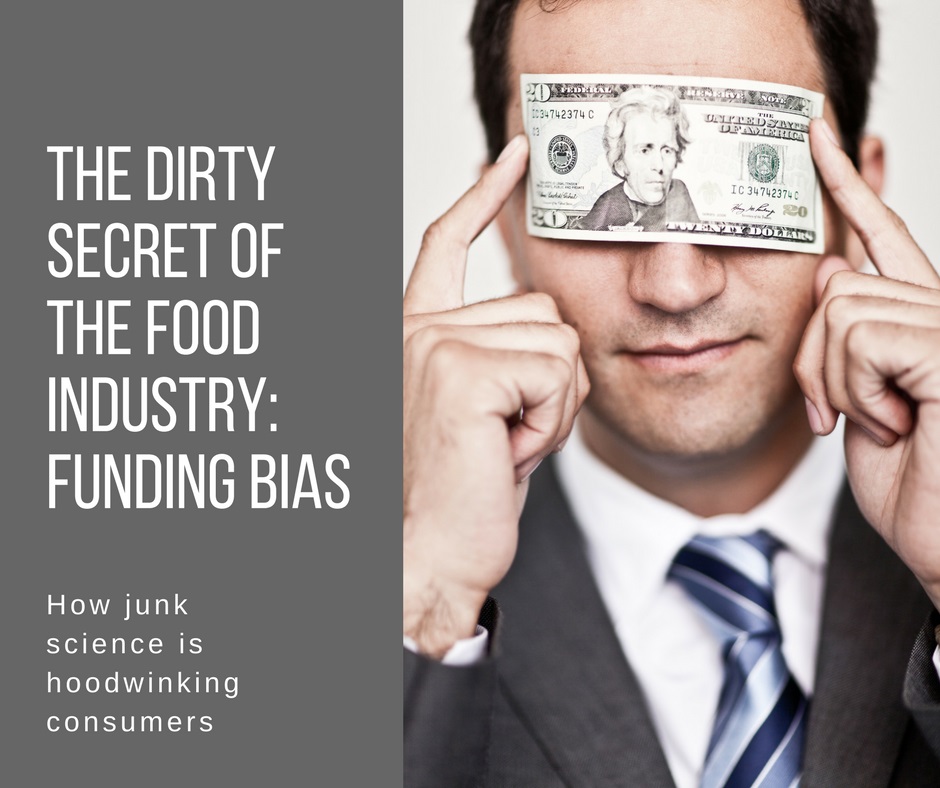The Dirty Secret of the Food Industry – Funding Bias
Summary: Funding bias occurs when research is funded by private industry and is potentially slanted, which could mislead consumers. Funding bias most often occurs in the food and supplement industry, such as with vitamins and omega 3 fish oils. This report shows you how to protect yourself against the problem. [This article first appeared on the website LongevityFacts.com. Author: Brady Hartman. ]
The funding bias scandal made headlines recently when the Journal of the American Medical Association (JAMA) broke the news that the sugar industry had paid-off Harvard scientists to down-play sugars role in heart disease. JAMA reported that the sugar industry trade group called the Sugar Research Foundation instructed Harvard researchers to publish reports that down-played sugar’s connection to heart disease, and instead cast doubts on saturated fat.
And in another study, after examining over 200 research studies paid for by a food or beverage organization, researchers from Children’s Hospital Boston found that industry-funded studies were four to eight times more likely to report positive health benefits from consuming those products.
Funding Bias Problem Is Bigger Than You Think
Food industry sponsorship of nutrition research is more common than most people may realize. The practice skews the results of research reports. It’s so common, in fact, there’s a name for it: funding bias. Also called sponsorship bias, the term funding bias refers to the tendency of a research study to support the interests of the organization who sponsors the study.
Another research study on funding bias, published in December 2016 also found a strong suggestion of sponsorship bias. Also publishing their findings in JAMA Internal Medicine, the researchers found a tendency of industry-sponsored research reports to be biased in favor of the sponsor. The team performed an extensive review of nearly 800 research reports, scanning for signs of bias. The study’s lead author, Professor Lisa Bero, Chair of Medicines Use and Health Outcomes at the University of Sydney in Australia, said that her new study report confirms earlier reports by
“providing definitive evidence that pharmaceutical industry funding of drug studies biases the results and conclusions to look favorable towards the drug of the sponsor”
Funding Bias Mainly In Food, Beverages, and Supplements
The investigators who have researched the problem, say that the funding bias problem is mostly concentrated in food, beverages, and supplements. Far less sponsorship bias has been found in the pharmaceutical industry. Even though most drug studies are funded by pharmaceutical firms, the researchers are scrutinized by the FDA.
In 2007 a group of researchers published a systematic review documenting the problem in the open access journal PLos Medicine. The researchers from Children’s Hospital, Boston examined 206 published research studies for evidence of funding bias. Most of these studies reported on the health benefits of soda and fruit juices. The authors found that research studies paid for by a food or beverage organization were four to eight times more likely to report positive health benefits from consuming those products.
How to Guard Against Biased Research
There is a flood of biased research reports. In order to protect oneself, a savvy consumer needs to learn how to separate the wheat from the chaff. A good question to ask is: who stands to profit?
Be leery of research conducted by organizations that stand to profit from the results of a research report, these studies have the greatest potential for funding bias.
It is a mandatory practice for authors to state their funding source in the research report. If the sponsors had anything to gain by the results of a study, then it is potentially tainted by funding bias. The good news is that it is now standard for authors to disclose conflicts of interest. A government funded report is much less likely to be affected by funding bias.
Be even more wary of supposed scientific evidence coming from promoters of products or ideas. These types of reports have the highest tendency to be affected by funding bias. When reading a magazine or internet article, it is a smart idea to fact check the actual research report, usually provided as a link. The study’s sponsors are usually found in the footer of the research report.
Funding Bias – Take Home Message
- Funding bias is a well-documented problem involving food, nutrition and supplement research.
- The problem causes consumers to poor decisions, based on misleading data.
- Consumers can protect themselves against sponsorship bias by avoiding skewed research. Read the actual research report to find out who sponsored the study and consider the source.
Related Article: To see an example of funding bias, read about the fish oil supplement industry in this related article.
Help Us Spread the Word On Funding Bias
Please reshare this post and help us spread the word. All it takes is one simple click on any social media link on this page.
Disclaimer
This article is intended for informational and educational purposes only and is not a substitute for professional medical advice, nor for the diagnosis or treatment of any medical condition. Do not delay or stop treatment based on anything you have read in this article.
References
Lundh A, Lexchin J, Mintzes B, Schroll JB, Bero L. Industry sponsorship and research outcome. Cochrane Database of Systematic Reviews 2017, Issue 2. Art. No.: MR000033. DOI: 10.1002/14651858.MR000033.pub3.
Lenard I Lesser, Cara B Ebbeling, Merrill Goozner, David Wypij, David S Ludwig. Relationship between Funding Source and Conclusion among Nutrition-Related Scientific Articles. PLoS medicine. January 9, 2007, https://doi.org/10.1371/journal.pmed.0040005

You have written a nice article .. well written
thanks for posting this
Everything looks good.. no pics in the article